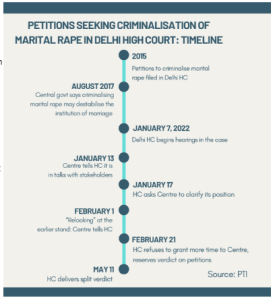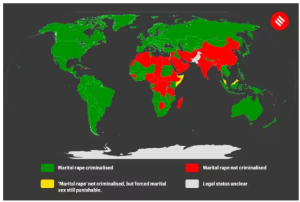Context: Recently, the Supreme Court agreed to hear a series of petitions seeking to criminalise marital rape.
| PYQ:
Q. We are witnessing increasing instances of sexual violence against women in the country. Despite existing legal provisions against it, the number of such incidences is on the rise. Suggest some innovative measures to tackle this menace. (2014) |
About Marital Rape:

- Marital rape or spousal rape is the act of sexual intercourse with one’s spouse without their consent.
- The lack of consent is the primary defining factor and the act need not involve physical violence.
- Although marital rape is now widely seen as a form of sexual violence, historically, sexual intercourse within marriage was regarded as a spouse’s right.
History of the Marital rape law in India:
- The Domestic Violence Act, 2005 hints at marital rape by any form of sexual abuse in a live-in or marriage relationship. However, it only provides for civil remedies.
- There is no way for marital rape victims in India to initiate criminal proceedings against their perpetrator.
Why Criminalizing Marital rape in India is important?
- Estimates from the third (2005-06) and fourth (2015-16) rounds of the National Family Health Survey (NFHS) revealed that the prevalence percentage of Intimate Partner Violence (IPV) against women ranges between 3% to 43% in different states of the country.
- The fifth round of the survey, held in 2019-20 and conducted in about 637,000 sample households in 707 districts of 28 states and eight union territories, suggests that 1 in 3 women in India aged 18-49 experience spousal violence, with at least 5%-6% of the women reporting sexual violence.
Law on Marital Rape:
Section 375 of IPC:
- The section lists seven notions of consent that, if vitiated, would constitute the offence of rape by a man.
- However, the provision contains a crucial exemption: Sexual intercourse or sexual acts by a man with his own wife, the wife not being under eighteen years of age, is not rape.
- The marital rape exception is premised on broadly two assumptions:
- Consent in perpetuity: This is the assumption that once married, a woman gives her permanent consent, which she cannot retract. This concept in the colonial-era law is rooted in the idea that a woman is the ‘property’ of the man who marries her.
- Expectation of sex: This is the assumption that a woman is duty-bound or is obligated to fulfill sexual responsibilities in a marriage, since the aim of marriage is procreation. And since the husband has a reasonable expectation of sex in a marriage, the provision implies that a woman cannot deny it.
How did the exception on marital rape find its way into the Indian Penal Code(IPC)?
- Indian Penal Code(IPC):
- The IPC was implemented in India during British colonial rule in 1860.
- Under the first version of the rules, the marital rape exception was applicable to women over ten years of age. In 1940, this age was raised to 15.
- In October 2017, the Supreme Court ruled that sexual intercourse by a man with his wife, the wife not being under eighteen years of age, is not rape.
- Doctrine of Coverture: It is an colonial-era convention that influenced the exceptional clause on marital rape.
- According to the Doctrine of Coverture, a woman has no individual legal identity after marriage.
Views on Marital Rape by Different Institution:
Law Commission of India’s Stand:
- The Law Commission of India, while making its 172nd Report on Review of Rape Laws, did not recommend criminalization of marital rape by amending the Exception to Section 375 of the Indian Penal Code.
Recommendations of J.S. Verma Committee:
- In 2013, the J.S. Verma Committee formed in the aftermath of the Nirbhaya gang-rape in Delhi, had recommended making marital rape a criminal offence.
Indian Judiciary:
- Kerala High Court: In 2021, Kerala High Court pronounced a judgment in which the court decided that even though marital rape isn’t recognised under the penal laws, it can act as a justifiable ground for divorce.
- Karnataka High Court :
- The Karnataka High Court had earlier held that a husband was liable to be charged for rape under the Indian Penal Code (IPC) if he has forcible sex with his wife.
- Delhi High Court:
- Delhi High Court Bench which delivered a split opinion, had favoured striking down the marital rape exception for being “unconstitutional”.
- However the Associate Judge on the High Court Bench, had rejected the plea to criminalise marital rape, noting that any change in the law should be carried out by the legislature since the issue required consideration of various aspects, including social, cultural and legal.
- Nimeshbhai Bharatbhai Desai vs State of Gujarat (2017) case:
- In this case, the Gujarat High Court elaborately dealt with the issue of marital rape.
- The Court stated that “making marital rape an offense will remove the destructive attitudes that promote the marital rape”.
- However, due to the non-recognition of marital rape as a crime, the Court held that the husband is liable only for outraging her modesty and unnatural sex.
- Independent Thought vs. Union of India (2017) case:
- In this case, the Supreme Court has criminalized sexual intercourse with a minor wife aged between 15 and 18 years.
- But, the SC refused to delve into the question of marital rape of adult women while examining an exception to Section 375.
| Arguments For Criminalising Marital Rape |
Arguments Against Criminalising Marital Rape |
- Consent and Autonomy: Marital rape laws emphasize that marriage does not imply perpetual consent to sexual activity.
|
- Cultural and Religious Considerations: Some opponents argue that criminalizing marital rape interferes with cultural and religious practices that uphold the belief that husbands have authority over their wives’ bodies within marriage.
|
- Addressing Gender Inequality: Marital rape laws acknowledge and address the historical gender imbalances that have often marginalized women within the institution of marriage.
|
- Difficulty of Enforcement: Proving non-consensual sex within a marital relationship might be complex, and the legal process could result in difficulties, such as a lack of evidence or conflicting testimonies.
|
- Protection from Abuse: Marital rape can be an extreme form of domestic violence, and criminalization provides legal protection to victims.
|
- Erosion of Family Values: Some opponents of criminalization argue that it could lead to the erosion of traditional family values by interfering with the sanctity of marriage and family life.
|
- Closing Legal Loopholes: By criminalizing marital rape, the law recognizes that rape is a crime regardless of the relationship between the parties involved.
|
- Presumption of False Accusations: Critics claim that criminalizing marital rape may open the door for false accusations, driven by motives such as revenge, divorce proceedings, or gaining an advantage in child custody battles.
|
- Psychological and Emotional Impact: Marital rape can have severe psychological and emotional consequences for victims.
|
- Privacy and Intrusion: Some opponents argue that laws against marital rape could lead to unwarranted intrusion by the state into intimate and private aspects of married life.
|
- Promoting Healthy Marital Relationships: Clear laws against marital rape promote healthy relationships based on mutual respect, trust, and communication.
|
- Potential for Legal Abuse: Critics express concerns that criminalizing marital rape might be misused as a weapon in contentious divorce or separation cases.
|
International Precedence:
- According to Amnesty International data, 77 out of 185 (42%) countries criminalise marital rape through legislation.
 In other countries, it is either not mentioned or is explicitly excluded from rape laws, both of which can lead to sexual violence.
In other countries, it is either not mentioned or is explicitly excluded from rape laws, both of which can lead to sexual violence.- Ten countries namely Ghana, India, Indonesia, Jordan, Lesotho, Nigeria, Oman, Singapore, Sri Lanka and Tanzania expressly allow marital rape of a woman or a girl by her husband.
- The first country to criminalise marital rape was the Soviet Union (1922) and the UK (1991) and the US (1993) were amongst the last Western nations to do so.
Way Forward:
- State intervention: When the State has an interference in the realm of matrimonial relation as far as cases of dowry, cruelty, divorce etc. then it is certainly necessary that the State and Law should interfere in the matter of such heinous crime of rape.
- Focus on Awareness Campaigns: Statutory reform accompanied by sensitization of the public (civilians, police, judges, medical personnel) on consent, medical care, and rehabilitation.
- Addressing the Assumption of Ownership: Eliminating the exemption of marital rape from criminal law to challenge the view of the wife as exclusive property of the husband.
- Legislation for Change: Advocating changes through legislative measures to criminalize marital rape and protect victims.
- SC’s Exceptional Powers under Article 142: Article 142 grants exceptional powers to SC. Under this, SC has the equivalent power of a lawmaker. So, in failure of Parliamentary legislation, the Courts can strike down the exception to Section 375.
News Source: The Hindu
![]() 20 Jul 2023
20 Jul 2023

 In other countries, it is either not mentioned or is explicitly excluded from rape laws, both of which can lead to sexual violence.
In other countries, it is either not mentioned or is explicitly excluded from rape laws, both of which can lead to sexual violence.